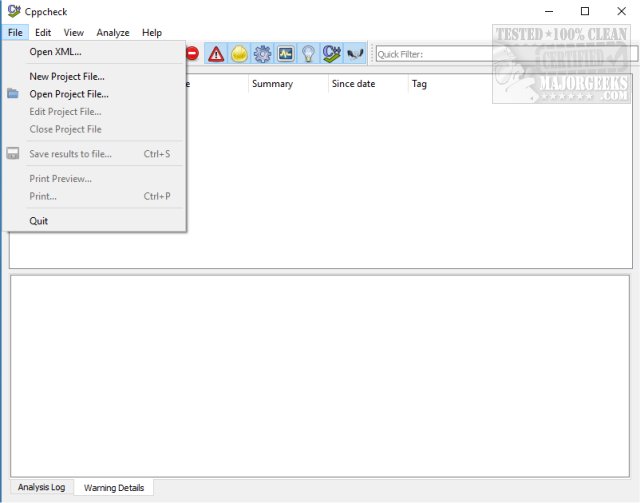Cppcheck 2.18.0 has been released, enhancing the capabilities of this free and open-source static analysis tool designed for C and C++ programming languages. Cppcheck effectively identifies issues such as memory leaks, mismatching allocation and deallocation, buffer overruns, and various other coding errors. It offers a portable version, making it convenient for developers who switch between different machines.
Cppcheck goes beyond basic style checking; it actively searches for bugs, undefined behaviors, and risky coding practices that compilers might overlook. This includes critical issues like null pointer dereferencing, use-after-free bugs, and the improper use of memory allocation functions, which can lead to severe runtime errors or security vulnerabilities. What sets Cppcheck apart is its ability to not only identify problems but also explain their significance, helping developers understand the implications of their code's flaws.
Users can choose between two modes for utilizing Cppcheck: the command-line interface (CLI) for automation enthusiasts or a graphical user interface (GUI) for those who prefer a visual approach. The CLI is suitable for integration into build systems and continuous integration (CI) pipelines, allowing for comprehensive scans of files or entire projects, and generating user-friendly reports. The GUI, on the other hand, provides an accessible way to navigate warnings and view code in context, making it akin to a second opinion on code quality without any condescension.
For those looking for a portable solution, Cppcheck offers a standalone version that can be run from a USB stick, making it an ideal tool for educators assessing student projects, freelancers managing various gigs, or anyone wanting to ensure consistency between home and work environments.
Notable features of Cppcheck include customizable checks, support for multiple compilers and platforms, and its ability to detect a wide range of issues like memory leaks, uninitialized variables, null dereferences, buffer overruns, invalid STL usage, integer overflows, division by zero, out-of-bounds errors, and dead or dangling pointers.
In conclusion, Cppcheck is an essential tool for C and C++ developers seeking more robust error detection than what standard compilers provide. It proves particularly valuable for catching complex bugs early in the development process, ultimately saving time and reducing frustration. Whether working independently, teaching, or managing a team, incorporating Cppcheck into the development workflow is a wise decision.
With the continuous evolution of coding practices and the growing complexity of software projects, tools like Cppcheck are becoming increasingly vital. As C++ standards evolve and new features are introduced, Cppcheck is likely to expand its capabilities, ensuring that developers have access to up-to-date resources to maintain code quality and security
Cppcheck goes beyond basic style checking; it actively searches for bugs, undefined behaviors, and risky coding practices that compilers might overlook. This includes critical issues like null pointer dereferencing, use-after-free bugs, and the improper use of memory allocation functions, which can lead to severe runtime errors or security vulnerabilities. What sets Cppcheck apart is its ability to not only identify problems but also explain their significance, helping developers understand the implications of their code's flaws.
Users can choose between two modes for utilizing Cppcheck: the command-line interface (CLI) for automation enthusiasts or a graphical user interface (GUI) for those who prefer a visual approach. The CLI is suitable for integration into build systems and continuous integration (CI) pipelines, allowing for comprehensive scans of files or entire projects, and generating user-friendly reports. The GUI, on the other hand, provides an accessible way to navigate warnings and view code in context, making it akin to a second opinion on code quality without any condescension.
For those looking for a portable solution, Cppcheck offers a standalone version that can be run from a USB stick, making it an ideal tool for educators assessing student projects, freelancers managing various gigs, or anyone wanting to ensure consistency between home and work environments.
Notable features of Cppcheck include customizable checks, support for multiple compilers and platforms, and its ability to detect a wide range of issues like memory leaks, uninitialized variables, null dereferences, buffer overruns, invalid STL usage, integer overflows, division by zero, out-of-bounds errors, and dead or dangling pointers.
In conclusion, Cppcheck is an essential tool for C and C++ developers seeking more robust error detection than what standard compilers provide. It proves particularly valuable for catching complex bugs early in the development process, ultimately saving time and reducing frustration. Whether working independently, teaching, or managing a team, incorporating Cppcheck into the development workflow is a wise decision.
With the continuous evolution of coding practices and the growing complexity of software projects, tools like Cppcheck are becoming increasingly vital. As C++ standards evolve and new features are introduced, Cppcheck is likely to expand its capabilities, ensuring that developers have access to up-to-date resources to maintain code quality and security
Cppcheck 2.18.0 released
Cppcheck is a free and Open Source static analysis tool for C/C++ code to check for memory leaks, mismatching allocation-deallocation, buffer overrun, and more. Portable version is also available.


